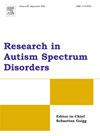Skill-based treatment for challenging behavior in autism spectrum disorder: A scoping review of treatment characteristics and outcomes
IF 2.2
4区 医学
Q1 EDUCATION, SPECIAL
引用次数: 0
Abstract
Background
Behavioral interventions based on the principles of applied behavior analysis (ABA) are considered the gold standard approach for treating challenging behaviors commonly exhibited by children with autism spectrum disorder (ASD). However, questions have arisen concerning the safety of implementing traditional ABA procedures for the treatment of challenging behavior in natural settings. Over the past decade, a treatment package known as skill-based treatment (SBT) has emerged that may allow challenging behaviors in this population to be addressed in a safe, efficient, and effective manner.
Methods
We reviewed and summarized studies utilizing SBT published in English between 2014 and September 2023 using PsychINFO and PubMed databases. Two independent reviewers screened citations for inclusion. Data abstraction was performed by one reviewer and verified by a second reviewer.
Results
Twenty-one studies (3 consecutive controlled case series and 18 utilizing single-case experimental designs) met the inclusion criteria describing SBT conducted with 87 individuals. The majority of individuals treated with SBT were autistic children with language levels varying from non-vocal to fully fluent. Treatments were implemented in a variety of settings at least 1–2 times per week, with treatment requiring a range of 4 - 48.5 h of clinician time. Rates of challenging behavior were reported to decrease by 98.2 % (range: 90–100 %) on average. Treatments were implemented via telehealth for 8 individuals (9.2%). Data concerning treatment maintenance was reported for just 7 individuals (8.1 %).
Conclusions
SBT is a potentially effective treatment procedure for challenging behavior that can be conducted in a variety of settings including the child’s home, school, and via telehealth. However, future research is needed to understand the long-term effectiveness of SBT. Randomized controlled trials of SBT are also necessary in order to study the safety and efficacy of this treatment approach.
自闭症谱系障碍中挑战行为的技能治疗:治疗特征和结果的范围回顾
基于应用行为分析(ABA)原则的行为干预被认为是治疗自闭症谱系障碍(ASD)儿童常见的挑战性行为的金标准方法。然而,关于在自然环境中实施传统ABA程序治疗挑战性行为的安全性问题已经出现。在过去的十年里,一种被称为基于技能的治疗(SBT)的治疗方案已经出现,它可以让这一人群中的挑战性行为以一种安全、高效和有效的方式得到解决。方法回顾和总结2014年至2023年9月在PsychINFO和PubMed数据库中发表的英文SBT研究。两名独立审稿人筛选了纳入的引文。数据抽象由一名审阅者执行,并由另一名审阅者进行验证。结果有21项研究(3个连续对照病例系列,18个采用单病例实验设计)符合SBT的纳入标准,共涉及87例个体。大多数接受SBT治疗的人都是自闭症儿童,他们的语言水平从无声到完全流利不等。治疗在不同的环境中实施,每周至少1-2次,治疗需要4 - 48.5 h的临床时间。据报道,挑战行为的比率平均下降了98.2% %(范围:90-100 %)。通过远程医疗对8人(9.2%)实施治疗。有关治疗维持的数据仅报告了7人(8.1 %)。结论ssbt是一种潜在有效的治疗挑战性行为的方法,可以在各种环境中进行,包括儿童的家庭、学校和远程医疗。然而,需要进一步的研究来了解SBT的长期有效性。为了研究这种治疗方法的安全性和有效性,SBT的随机对照试验也是必要的。
本文章由计算机程序翻译,如有差异,请以英文原文为准。
求助全文
约1分钟内获得全文
求助全文
来源期刊

Research in Autism Spectrum Disorders
Multiple-
CiteScore
4.20
自引率
8.00%
发文量
108
期刊介绍:
Research in Autism Spectrum Disorders (RASD) publishes high quality empirical articles and reviews that contribute to a better understanding of Autism Spectrum Disorders (ASD) at all levels of description; genetic, neurobiological, cognitive, and behavioral. The primary focus of the journal is to bridge the gap between basic research at these levels, and the practical questions and difficulties that are faced by individuals with ASD and their families, as well as carers, educators and clinicians. In addition, the journal encourages submissions on topics that remain under-researched in the field. We know shamefully little about the causes and consequences of the significant language and general intellectual impairments that characterize half of all individuals with ASD. We know even less about the challenges that women with ASD face and less still about the needs of individuals with ASD as they grow older. Medical and psychological co-morbidities and the complications they bring with them for the diagnosis and treatment of ASD represents another area of relatively little research. At RASD we are committed to promoting high-quality and rigorous research on all of these issues, and we look forward to receiving many excellent submissions.
 求助内容:
求助内容: 应助结果提醒方式:
应助结果提醒方式:


